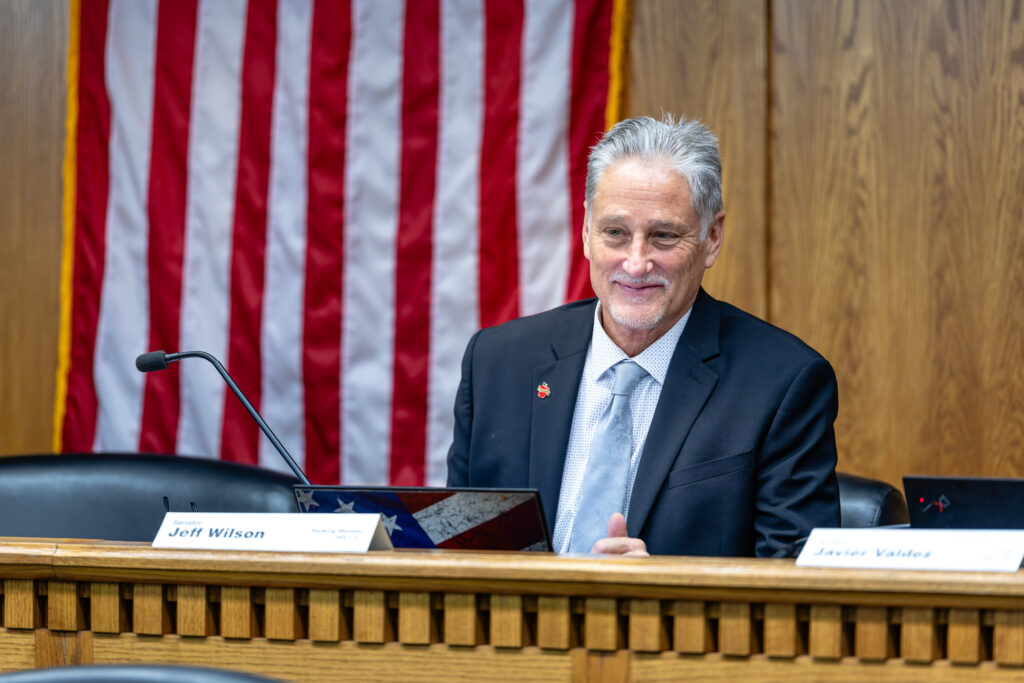OLYMPIA – A bill creating new obstacles for initiative signature campaigns is scheduled for a vote Friday in a Senate committee, and Sen. Jeff Wilson, R-Longview, says the Democrat-sponsored legislation is a major threat to a cherished constitutional right.
If lawmakers pass Senate Bill 5382, Wilson says the cost of initiative campaigns will dramatically increase, far fewer initiatives will qualify for the ballot, and volunteers will have second thoughts about carrying petitions if there is a chance they will go to jail for it. Wilson is the lead Republican member on the Senate State Government, Tribal Affairs and Elections Committee, which will consider the bill Friday morning at 10:30 a.m.
At the same meeting, lawmakers also will take testimony on Senate Bill 5434, a bill that limits the governor’s emergency powers by allowing the Legislature to end a declared state of emergency.
The effort by legislative Democrats to crack down on the initiative process has become one of the most controversial issues of the 2025 session. Some 3,093 people signed in to register their opinions when the initiative bill came up for a hearing Feb. 4. Of those sign-ins, 1,859 were opposed and just 1,230 were in favor. Wilson said the opposition testimony was so compelling he is surprised the bill has been scheduled for a vote.
“Every few years we see an effort by our Democratic friends to crack down on the initiative process and reduce the power of the people,” Wilson said. “There always is some vague explanation about how this will prevent problems. But there appears to be only one problem with the initiative process, and that’s that the people keep using it.
“Last year my majority colleagues felt threatened when the people collected 3.2 million signatures and presented the state with seven initiatives to overturn parts of their so-called ‘progressive’ agenda. I guess they think the best way to defeat public opposition is to make it harder for the people to speak.”
Senate Bill 5382 requires signature gatherers to sign a statement on petition sheets, swearing that to the best of their knowledge:
- All signers provided correct information regarding their names and addresses,
- All signers were eligible and all signers reviewed the petition sheet, and
- None of the signers were paid or otherwise compensated for their signatures.
This new requirement does not require that signature gatherers confirm voters’ names, addresses and eligibility – that’s the job of state elections officials. The statement merely concerns a signature gatherer’s beliefs. Yet a signature gatherer who swears falsely is liable for a fine of up to $5,000 and a year in jail.
At last week’s hearing on the bill, advocates said the measure would guard against “fraud and mistake” by making signature gatherers more cognizant of state rules. But they did not present any examples of fraud that the bill might have addressed, nor was it clear how the sworn statements would prevent fraud in any case. Fraud in Washington initiative campaigns is vanishingly rare, and the last case in which canvassers were accused of falsifying signatures was in 2013.
After Oregon passed a similar rule in 2002, initiative promoter Tim Eyman told the committee that the cost to qualify initiatives tripled, the number of initiatives qualified was reduced by two-thirds, and the rates of forgery and fraud doubled.
Brian Heywood, who sponsored last year’s seven initiatives as part of his Let’s Go Washington campaign, said his paid signature gatherers were joined by some 10,000 volunteers. Heywood said the threat of jail time probably would have discouraged 90 percent of them from participating. “It’s an unreasonable burden to put on the process,” he said.
Wilson noted that the state constitution declares that the initiative is “the first power reserved by the people.” He said it’s hard enough already for campaigns to gather all the signatures they need to place a measure on the ballot, 386,000 for initiatives and 193,000 for referendums. The proposal places a new condition on the exercise of a constitutional right, and even if it is upheld by courts, Wilson said the idea is wrongheaded.
“This finishes the job my colleagues started in 2023, when they banned advisory votes and prevented the people from telling the Legislature what they think of tax increases,” Wilson said. “Last week in the Senate, they made short work of an initiative from the people last year to guarantee parental rights in the public schools, by repealing the parts they didn’t like. And now we have a bill that will make it harder for the people to run initiatives in the future.
“This shows a real disdain for the people. They’re saying, how dare they speak? They think they know better. I’m sure the people have a different opinion about that.”









